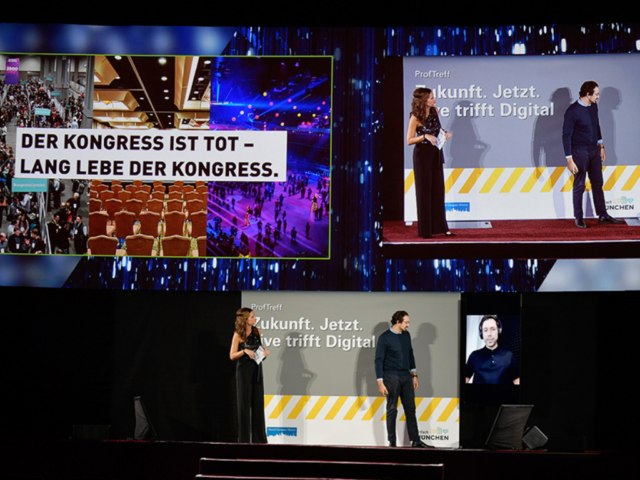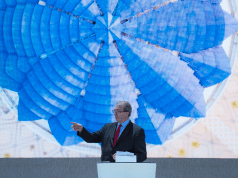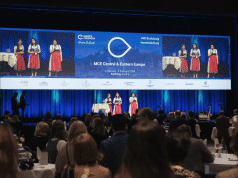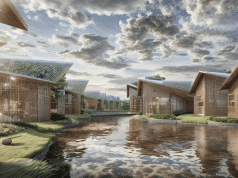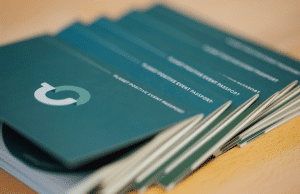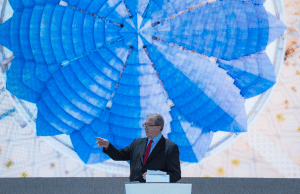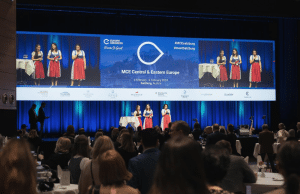A longstanding tradition of bringing Munich’s scientists and event professionals together
Around 200 guests followed the invitation of the Munich Congress Alliance (MCA) and the Munich Convention Bureau to attend this year’s ProfTreff on October 6th. Whilst the event’s 31-year anniversary was one reason to celebrate, attendees were also witnessing a premiere: For the first time, invited guests were given the opportunity to choose between attending the event on-site or virtually – the very first hybrid ProfTreff was born. But what is the story behind this long-established event? And how has COVID-19 impacted this year’s ProfTreff? Learn more in the following article.
Networks that shape the future
The idea of promoting the exchange between Munich’s scientific community and its event industry was born by the Munich Congress Alliance as early as 1989. The network of Munich based event professionals wanted to create an event that showcased the advantages of hosting conferences and congresses in Munich. Their aim was to win the city’s decision-makers in the fields of science and education as advocates who would ultimately bring their association events to the Bavarian capital. However, the event’s organizers realized that they needed more than pure networking formats to achieve this goal. Therefore, the exchange of knowledge and information was put in the foreground at the very first ProfTreff in 1989 and has remained a key element ever since. Additionally, the events were to be held at extraordinary locations and with an entertaining program in order to leave a lasting impression on the scientific community.
This successful concept was intended to be continued this year, but the coronavirus left its mark on the ProfTreff: The event, which was originally planned as a face-to-face gathering, had to be thoroughly rethought and adapted. Therefore, the event’s organizers opted to offer 2020’s ProfTreff as a hybrid event for the first time. This trendsetting format is the symbiosis of traditional face-to-face formats combined with an additional virtual event component. This gives event participants the choice of attending on-site or virtually from anywhere in the world. Particularly nowadays, this can significantly increase an event’s reach. The Munich Congress Alliance and Munich Convention Bureau entrusted trendhouse event marketing with the planning of the event.
Live meets digital
On October 6th, 2020, the time had come: “Future. Now. Live meets Digital” was the motto for this year’s ProfTreff. Around 100 scientists and event professional gathered for the event’s corona-compliant face-to-face component which took place in the Gloria Palace – one of Germany’s most historic cinemas. Another 100 guests joined the event virtually. The event’s agenda was fully in line with this year’s motto: Keynotes, discussions and audiovisual contributions invited attendees to explore the future of digital and analogue events as well as innovative conference concepts. Speakers included Felix Rundel, CEO of the Falling Walls Foundation, and Sami Benchekroun, co-founder and CEO of the Berlin start-up Morressier. However, the hybrid format itself may have offered the most impressive insight into the future of events.

A complementing mix
The concept proved to be a success and organizers and participants alike were delighted with ProfTreff’s first hybrid edition. Clemens Baumgärtner, Head of the Department of Labor and Commerce of the City of Munich, and Wolfgang Kerkhoff, Business and Congress Coach as well as Chairman of the Munich Congress Alliance, are convinced of the advantages of digital formats, such as the increased reach or the eliminated travel times. Nevertheless, they also emphasize the value of traditional face-to-face formats: “We will not do without personal interactions in the long term. Congresses will take place.”
The hybrid ProfTreff 2020 has impressively highlighted the possibilities for analogue and virtual event concepts in Munich. The Munich Convention Bureau is happy to share its experiences and network to support all planners who are looking to host their events in Munich – whether analogue, virtual or hybrid.


